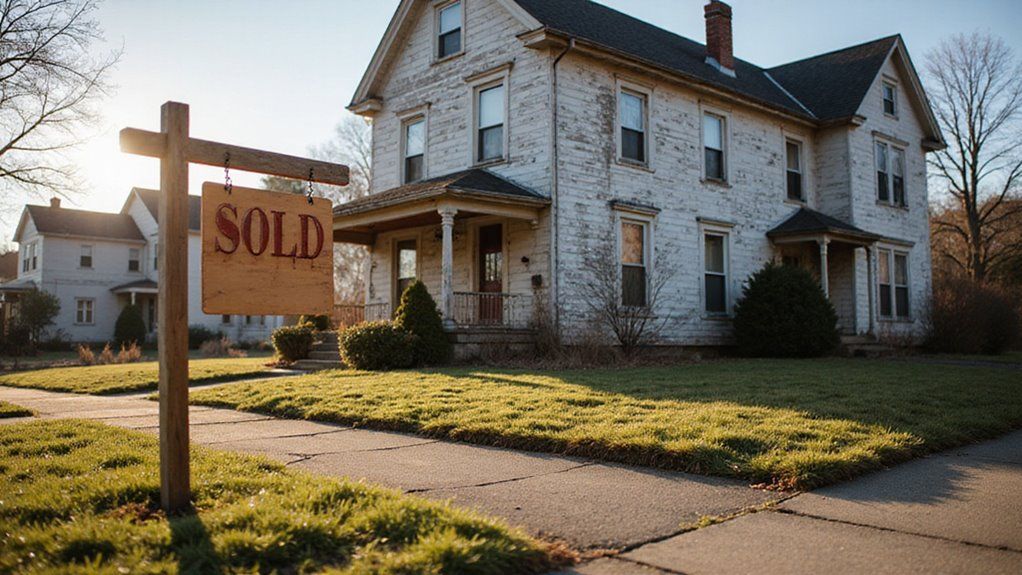Selling Your House Below Market Value in Pennsylvania

Trapped in a home you can’t afford, watching as foreclosure notices pile up. The stress of holding onto property during financial hardship can become overwhelming. Pennsylvania homeowners facing these challenges can find relief through below-market sales, offering a legitimate exit strategy when time matters more than profit.
You can legally sell your Pennsylvania house below market value, typically for 55-85% of its worth. This approach appeals most to sellers facing urgent situations like financial distress, foreclosure, unexpected inheritance, or mandatory relocation.
In this blog I will explore everything about selling your Pennsylvania property below market price.
What is Selling Below Market Value?
Selling below market value means accepting less money than comparable homes in your area typically sell for. This strategy creates opportunities for buyers seeking affordable housing or helps family members in need.
Some sellers choose this approach due to financial hardship, urgent relocation needs, or inherited property situations. This practice is legal in Pennsylvania but carries specific tax implications and reporting requirements.
For instance, you might need to file additional tax forms. As a result of your decision, both you and the buyer can benefit from the transaction.
Why Would Someone Sell Their Home Below Market Value?
You might need to sell below market value for several legitimate reasons that require quick action or minimize financial loss.
Common situations include facing foreclosure, dealing with inherited property you can’t maintain, or needing to relocate urgently for work or family.
Property damage, mounting debt, or the desire to avoid lengthy repairs can also make a below-market sale your most practical option.
Financial Distress Situations
Financial hardship creates urgent selling needs for homeowners. Quick property sales below market value provide relief when medical bills, job loss, or debt become overwhelming. You can avoid foreclosure and mounting late fees by selling fast. This decision protects your credit score from long-term damage.
Cash buyers close deals within days instead of months. This speed helps you address creditors’ demands immediately. Pennsylvania law allows homeowners to prioritize urgent financial needs when selling property. The immediate cash infusion lets you resolve pressing obligations.
In these situations, financial survival often matters more than maximum profit. Your family’s immediate needs deserve priority. Moving forward with dignity becomes possible once urgent debts are settled.
Inherited Property Considerations
Inheriting property creates unexpected financial burdens. Maintenance costs, property taxes, and insurance payments continue while you settle the estate.
Below-market sales often make sense when heirs live far away or need to split proceeds quickly. This approach resolves complications efficiently.
Pennsylvania inheritance tax applies to estate transfers, with certain exemptions for direct descendants. Additionally, selling below market value may trigger gift tax reporting requirements when transferring to family members.
A real estate lawyer can help navigate these complexities. Professional guidance ensures proper deed transfers and protects everyone’s interests throughout the transaction. The right legal advice prevents costly mistakes later.
Relocation Urgency
Fast home sales are essential when you must relocate quickly. Career opportunities and family emergencies often require immediate moves that traditional sales can’t accommodate. These situations demand speed over maximum profit.
Urgent sales typically yield 70-85% of market value but offer guaranteed, rapid closings. Quick buyers eliminate listing periods, showings, and lengthy negotiations.
You’ll still face Pennsylvania’s realty transfer tax obligations. However, the certainty outweighs the financial sacrifice. Document your relocation reasons carefully for tax purposes. Consult a real estate attorney about disclosure requirements.
Furthermore, work with cash buyers experienced in compressed timeframes who can close within weeks rather than months.
Major Property Damage
Major damage makes as-is sales the most practical choice for homeowners. Foundation issues, fire damage, and water intrusion often cost too much to repair. Selling below market value lets you move on without expensive renovations. Additionally, it provides closure during a stressful situation.
Pennsylvania distressed property buyers typically offer between 55-85% of market value. The median as-is sale price hovers around 70% of potential market value. Despite the discount, this approach saves you from repair headaches. Moreover, investors get the opportunity to rehabilitate the property for future families.
Avoiding Foreclosure
Several options exist to avoid foreclosure on your home. You can sell your property below market value as a quick escape from mortgage debt. This approach preserves some equity while minimizing credit damage.
Real estate investors often purchase properties within days, offering fast relief. Foreclosure damages your credit for 7 years and creates a public record. In contrast, a below-market sale causes minimal credit harm. You may recover some money through this private transaction. Additionally, you maintain more control over the outcome.
Contact your mortgage company if you owe more than the property’s worth. A real estate attorney can help with transfer tax requirements. They’ll protect your interests throughout this challenging process.
Sell Your House Fast in Pennsylvania Without Expensive Repairs, Junk Removal, or Cleaning!!
We buy houses for cash in Pennsylvania! We will make you a Fast, Fair, Cash Offer To Buy Your House As-Is. There’s No Obligation To Accept. We are here to take the hassle out of selling your home.
What Are the Legal Implications in Pennsylvania?

When you sell below market value in Pennsylvania, you’ll need to navigate specific legal requirements that protect both you and the buyer.
Every deed transfer must include a precise legal description and a Realty Transfer Tax Statement of Value, regardless of your sale price.
You’ll also face tax implications and significant complications with your existing mortgage that require careful attention before closing.
Pennsylvania Deed Transfer Requirements
Pennsylvania requires specific documentation for below-market property sales. Your deed must include an accurate legal description and meet state recording standards.
The law mandates a Realty Transfer Tax Statement of Value with each deed submission. This form declares the consideration paid or true market value.
The transparency protects both parties from future legal issues. Pennsylvania charges a 1% state realty transfer tax plus local municipal and school district taxes. These fees apply even to below-market transactions.
Furthermore, proper completion of all forms ensures smooth transfer of ownership. The documentation process safeguards your interests and creates a clear paper trail.
Tax Considerations
Several taxes apply when selling below market value. You’ll pay a 2% realty transfer tax split between state and local governments.
Federal capital gains taxes will be due on any profit from the sale.
Gift tax reporting becomes necessary when discounts exceed $19,000 per recipient. Tax authorities don’t simply accept your stated sale price. County assessment values serve as reference points when sales prices appear unusually low.
These assessments help prevent tax avoidance through artificially discounted transactions. Before finalizing any below-market sale, talk with a qualified tax professional. This conversation can save you from unexpected tax consequences later. Tax implications vary based on your specific situation and relationship to the buyer.
Mortgage Deficiency Concerns
A mortgage deficiency occurs when you sell your home for less than you owe. You need lender approval before attempting a short sale in Pennsylvania. Your mortgage company must agree to accept less than the full loan balance.
Lenders have specific requirements for short sales that vary by institution. Contact them early to understand their process and potential financial impacts.
This proactive step can prevent complications later. Furthermore, professional guidance matters in these situations. A real estate attorney can represent your interests during negotiations. They help ensure the agreement protects you from future collection attempts.
How to Determine Your Home’s True Market Value?
Before you can sell below market value, you need to know what your home is actually worth. You’ll want to use professional appraisals, comparative market analysis, and online valuation tools to establish a baseline.
These methods help you adjust for your property’s condition and give you a defensible price that satisfies tax authorities and protects your financial interests.
Professional Appraisal Process
A professional appraisal determines your home’s true market value before selling below market price in Pennsylvania. Licensed appraisers conduct objective evaluations based on property condition, location, and features. They also analyze recent comparable sales in your neighborhood.
The appraisal includes a thorough physical inspection of your home’s structure and systems. Appraisers review market data from similar properties sold within the past six months. They make adjustments for condition differences, square footage variations, and amenity upgrades.
Finally, you’ll receive a detailed valuation report documenting your property’s fair market value. This documentation serves two important purposes.
It provides legal protection for your sale decision. The report also establishes baseline pricing for tax purposes when selling below market value.
Comparative Market Analysis
A CMA helps determine your Pennsylvania home’s value without an expensive formal appraisal. Real estate agents create these reports by analyzing similar properties in your area. They compare homes with matching location, size, condition, and key features.
Your CMA will include detailed information about current listings and recent sales. Data typically covers properties sold within the previous three to six months. This analysis prevents you from selling below fair market value.
When dealing with family transfers or investors, a CMA provides valuable documentation. This paperwork protects you during tax assessments and potential gift tax situations. Furthermore, it establishes true market value with evidence.
Online Valuation Tools
Free online tools can estimate your Pennsylvania home’s value quickly. These digital platforms offer convenient starting points for property assessment. You shouldn’t rely solely on them for below-market sales.
Popular options include Zillow’s Zestimate, Realtor.com’s Home Value Estimator, Redfin’s Estimate, and Eppraisal.com. Each tool uses different data sources and calculation methods.
However, these automated systems often miss important details about unique properties. Most online valuation tools lack accuracy for homes with recent renovations or unusual features. For tax reporting and legal compliance, professional appraisals remain essential. A licensed appraiser provides defensible fair market values that meet regulatory requirements.
Adjusting for Property Condition
Property condition affects your home’s value and sale price. Document all repair needs with contractor estimates to know exact costs.
Calculate how age, outdated systems, or structural issues reduce your property’s value. Look at similar as-is home sales versus renovated properties in your area to understand price differences.
Cash buyers in Pennsylvania typically offer between 55-85% of market value to account for repairs. A realistic assessment of your property’s condition helps set a fair price while meeting your financial needs and timeline.
What Are the Pros and Cons of Below-Market Sales?

Selling below market value offers clear advantages like closing faster and avoiding repairs, but you’ll need to weigh these benefits against immediate financial losses.
You’re essentially trading equity for speed and convenience, which impacts your net proceeds and future purchasing power. Understanding both the short-term gains and long-term financial consequences helps you make an informed decision that aligns with your specific circumstances.
Benefits of Quick Below-Market Sales
Fast sales at reduced prices offer immediate solutions when time matters more than profit. You receive cash promptly and move on with your life.
Immediate liquidity transforms property into cash within days. This speed eliminates mortgage payments during lengthy traditional sales.
No repair expenses occur because buyers accept properties as-is.
Foreclosure prevention becomes possible when you sell quickly. Your credit score remains intact while avoiding bank penalties.
Instead of uncertain waiting, you gain definite closure.
Although you receive less money, you save on realtor commissions, holding costs, and maintenance expenses. Furthermore, the psychological relief from resolving financial pressure creates valuable peace of mind.
Potential Financial Drawbacks
You’ll receive less money when selling below market value. Below-market sales typically yield 30-45% less than traditional sales. This means losing thousands in home equity.
Real estate commissions still apply if using agents. Pennsylvania charges transfer tax based on assessed value, not actual sale price. Property tax assessments in your neighborhood might also be affected.
For those helping family members or resolving financial problems, these losses may seem worthwhile. Understanding the true financial impact helps you make better decisions.
Your personal circumstances and goals should guide whether a below-market sale makes sense for your situation.
Long-Term Implications
Decisions made during a short sale affect your finances for years afterward. Property liens will reduce your proceeds from any future sales. Your retirement plans may suffer from limited home equity access.
Future lenders typically review your complete property sale history during loan qualification processes. Tax reporting requirements often continue for several years post-sale.
These impacts can limit your financial options. Understanding these consequences before signing protects your long-term financial health. A short sale today might solve immediate problems but creates lasting financial ripples.
How to Sell Your House Below Market Value in Pennsylvania?
If you’re ready to sell your house below market value in Pennsylvania, you’ll need to prepare specific legal documents, find reliable buyers, and understand the closing requirements.
The process involves gathering your deed, realty transfer tax forms, and property disclosures while vetting potential cash buyers or investors.
You’ll then negotiate terms that protect your interests and complete the sale according to Pennsylvania’s transfer regulations.
Prepare Necessary Documentation
You need specific documents for a below-market sale in Pennsylvania. The deed must include a precise legal description of your property. A Realty Transfer Tax Statement of Value is required to declare the actual consideration. Recent appraisal documents establish fair market value for the transaction.
Pennsylvania Consolidated Statutes Title 72 governs property transfers and tax requirements. Family sales below market value may need gift tax documentation. Mortgage payoff statements verify all liens will be satisfied at closing.
Furthermore, disclosure forms protect both parties during the transaction. A real estate attorney can review everything to ensure compliance. These documents safeguard your interests and prevent future legal issues.
Finding Reputable Cash Buyers
Reputable cash buyers have verifiable credentials and positive customer feedback. Check Better Business Bureau ratings and online reviews before contacting any investor. Request references from previous sellers to confirm their reliability.
A legitimate company will provide written offers quickly without asking for money upfront. Cash buyers typically offer between 55% and 85% of your property’s market value. This lower price reflects the convenience of as-is sales without agent commissions. The tradeoff is worthwhile when facing urgent situations like financial hardship or necessary relocation.
Compare at least three different offers to ensure fair treatment. Consult a real estate attorney to review all documents before signing anything.
This professional will verify the contract protects you and meets Pennsylvania’s specific transfer tax requirements.
Negotiating Fair Terms
Multiple offers create leverage when dealing with cash buyers. You can protect your interests even with a distressed property sale. Key negotiation points include having buyers pay closing costs, verifying their funds before acceptance, setting reasonable inspection timelines, and clarifying lien responsibilities.
Buyers should provide proof of funds documentation before you accept any offer. Don’t rush to take the first proposal. Instead, review each offer’s complete package - not just price but conditions too. Although you’re selling below market value, you deserve fair treatment and protection.
Cash buyers typically expect a 10-30% discount, but this doesn’t mean accepting unreasonable terms. With proper negotiation, you can find a mutually beneficial arrangement that respects your timeline and financial needs.
Closing Process Specifics
Pennsylvania below-market sales require special paperwork. You must file a Realty Transfer Tax Statement of Value that declares the price paid or true property value.
Transfer tax applies to whichever is higher—the sale price or assessed value adjusted by the common level ratio. Your settlement statement shows these calculations and any family equity gifts.
The title company helps ensure proper documentation. However, consulting a real estate attorney remains advisable. A lawyer can verify compliance with all regulations. This extra step protects everyone involved in the transaction. For a smooth process, gather all necessary documents early. Your title agent can provide a checklist of required items.
Who Buys Houses Below Market Value in Pennsylvania?
You’ll find three main types of buyers willing to purchase your Pennsylvania home below market value. Cash home buying companies and real estate investors actively seek properties they can buy at 55-85% of market value, with the median as-is sale around 70%.
Family members also buy below market value, though you’ll need to report the price difference as a gift of equity if it exceeds the IRS threshold of $19,000 per person in 2024.
Cash Home Buying Companies
Cash home buyers offer quick house purchases without typical selling requirements. They provide offers within 24-48 hours after evaluating your property. Your home sells in any condition with no repairs needed. Transactions typically close in 7-14 days without realtor fees.
However, these conveniences come at a cost. You’ll receive approximately 55-85% of your home’s actual market value. This trade-off eliminates months of traditional selling stress.
For homeowners needing immediate cash or facing challenging property issues, these companies offer a valuable alternative to standard real estate transactions.
Real Estate Investors
Investors buy properties at steep discounts in Pennsylvania, often 20-40% below market value. They work directly with homeowners to solve challenging situations like underwater mortgages.
These professionals typically close deals within 7-30 days and cover all closing costs. Pennsylvania investors navigate realty transfer tax requirements and handle all legal documentation. Their expertise includes understanding property values across different counties.
Furthermore, they evaluate homes based on condition, location, and needed repairs. You’ll receive a written offer that addresses your specific situation. As a result, you can move forward quickly without the typical selling hassles or delays.
Family Transfers
Family property sales in Pennsylvania follow standard real estate procedures. The sale creates a gift of equity when pricing below market value. This requires proper tax reporting.
Gift tax filings become necessary when the price difference exceeds $19,000 per person annually. Pennsylvania still charges its 2% combined transfer tax on the assessed value. You need a deed with an accurate legal description. A Statement of Value must accompany this documentation.
Consider hiring a real estate attorney for this process. They ensure legal compliance for everyone involved. In fact, professional guidance protects all family members’ interests. Legal documentation safeguards your family’s property rights for years to come.
Need to Sell Your Pennsylvania Home Fast? Contact Pezon Properties Today
Pezon Properties can buy your Pennsylvania home quickly. We purchase houses directly with cash offers within 24 hours. No repairs or showings are needed when you work with us. Our process eliminates traditional listing hassles. You won’t deal with FSBO paperwork or competitive market challenges.
Furthermore, we cover all closing costs and handle the necessary documentation. We let you choose your closing date and provide fair cash offers regardless of your property’s condition. Contact Pezon Properties for a free consultation to discuss your situation without any obligation.
A Little About Pezon Properties
Pezon Properties is a local, family-owned home buying business that helps homeowners sell their properties quickly and easily without the stress of selling the traditional way.
We simplify the home selling process and eliminate the hassles that come with selling your home. You are provided with solutions, convenience, and a great customer experience. We are easy to work with and do fair, win-win deals.
We are not flippers or wholesalers looking to make a quick profit. We are from the Lehigh Valley and invest back into the community to make it a better place for us all to live. We have been working directly with our neighbors to buy homes since 2014.
Whether you are
tired of being a landlord, inherited a property that you do not want, are facing divorce or financial issues, or want to sell quickly without the headaches, reach out to us today and we will help you in any way we can.
484-484-0971.












